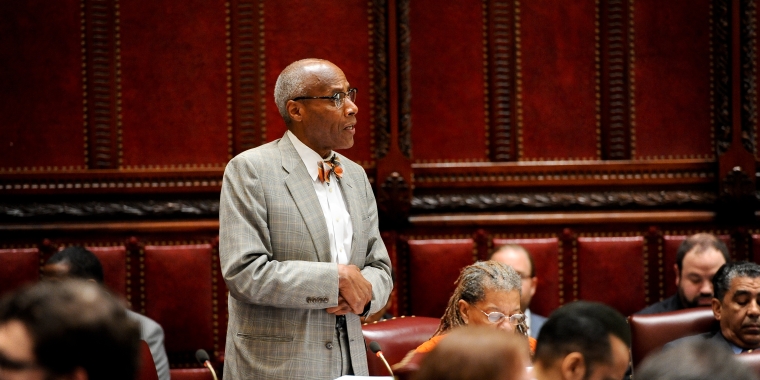
Testimony Of Senator Perkins | NYCHA's FY 2016 Annual Plan Public Hearing
Bill Perkins
August 12, 2015

Testimony Of State Senator Bill Perkins Before The New York City Housing Authority (NYCHA) | RE: NYCHA Draft FY 2016 Annual Plan Public Hearing
NYCHA Testimony Bullet Points
¨ I have nearly 50 New York City Housing Authority developments in my Senatorial District, spanning 324 buildings, 28,119 apartments and a total of number of 61,298 residents that I am privileged to represent.
- ¨ I have submitted my complete testimony to the Authority and will give an overview of several key points of consideration below.
¨ I am in complete agreement with all of the points made in the collective testimony submitted by the New York City Alliance To Preserve Public Housing, with particular emphasis on critical concerns raised with regard to the “Infill” Concept—including the Community Visioning Process, levels of Affordability and the Ownership Structure—and the transfer and conversion of public housing units into the Section 8 Program.
¨ My cardinal concern is that NYCHA is intentionally and fastidiously moving into a new operating model that relies upon the private sector. NYCHA now speaks of a new “business model” that “attracts outside financing” within a portfolio that “holds enormous untapped potential.”
¨ The one thing that separates NYCHA from private developers is that they serve the public good; they are a mission-based not-for profit organization. By definition, private developers serve a private interest; they exist to make money, whether off of exorbitant market rate rents or generous tax credits and subsidies, or both. Adding the profit motive to even one development or building in NYCHA is a step that is simply inconsistent with the mission of the Authority.
¨ So many examples exist of the public good being diluted and compromised by private greed; the funding structure of Charter Schools and the Puerto Rican debt crisis are two prime examples of the colossal ramifications of greed (guised as generosity) that supposedly serves the public good. It is through this lens that I view the plans of the Authority.
Infill, Revisited
With respect to the Infill proposal, I have a number of compelling concerns: (1) The 60% of AMI affordability standard for new units will effectively exclude over half of current NYCHA residents, and presumably half or more of those on the current wait list, would be effectively barred from securing a residence from this program; (2) Erecting market rate towers on NYCHA land will further exacerbate the rampant forces of hyper-gentrification and brand the Authority just like other developers and landlords, who develop financial capital, not human capital; (3) The Authority must be certain that new units created are permanently “affordable” forevermore and have all the same exact rights as traditional public housing units, including: rent caps, tenancy, succession rights and enhanced services; (4) The Authority must assure us the NYCHA residents have an affirmative preference for new units; and (5) The only and ultimate deciding factor as to whether a development should enter into any Infill transaction is the collective will and voice of the residents.
Elimination Of 15,000 Public Housing Units
With respect to the elimination of 15,000 public housing units via transfer to the Section 8 Voucher program, I beseech the Authority to do so only after a demonstration that the exact same rights, with respect to permanent affordability, tenancy, succession rights, and all of the other enhanced services offered at and through traditional NYCHA locations attach to these 15,000 units.
Enhanced Rent Collection
With respect to the enhanced collection of rent, I encourage the Authority to be mindful that: Many of the 26% of households who are behind on their rent are currently unable to legitimately pay the rent due to financial constraints; and (2) Many individuals are withholding rent, per pending litigation or outstanding repair requests or other actions with respect to the deterioration/inhabitability of their apartment. Clearly, it would be entirely counterproductive for NYCHA to commence more intense rent collection techniques on families, when the next step would be a termination proceeding, possible referral to a shelter, and circling back around in housing vulnerability spiral that we are taking steps to eradicate.
Conclusion
Revenue maximization and leveraging land was not part of the original mission of NYCHA—and I am convinced that the Authority sacrifices something important in doing so. NYCHA, as an affordable housing provider, has always been a success story and is one of the last bulwarks against the forces of gentrification and excessive market rate rents in our communities. In this new era, I hope that the Authority will be led and guided by the collective voices and will of the residents and take steps to ensure that the next generation of NYCHA are treated like the very first generation.
Share this Article or Press Release
Newsroom
Go to NewsroomIt's On! State Starts Eminent Domain For Columbia
July 17, 2008

